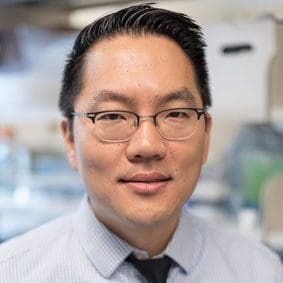
JOHN LEE, MD, PhD
David Geffen School of Medicine at UCLA
CureSearch Acceleration Initiative Award: 2023-2025
Focus: Ewing sarcoma
Project title: IL-18 armored STEAP1 CAR T cell therapy for Ewing sarcoma
"Metastatic Ewing sarcoma is rarely curable and current treatments like surgery, radiation and chemotherapy often don’t work well for advanced cases. Our hope is this treatment can one day lead to better outcomes for kids with this disease by making their immune systems better at fighting the cancer." - Dr. Lee
Ewing sarcoma (ES) is an aggressive and rare type of pediatric cancer involving bones and their surrounding soft tissue. In some cases, ES can become metastatic, meaning that it has spread to other parts of the body. Metastatic ES is a deadly disease, with a grim 5-year survival rate of 15-30%. Despite the availability of common treatments such as surgery, radiation, and chemotherapy, the prognosis of this disease remains poor. Therefore, new, and effective therapies are desperately needed for children with metastatic ES.
John Lee, MD, PhD is a CureSearch Acceleration Initiative Awardee at the David Geffen School of Medicine at the University of California, Los Angeles working on a new targeted immune-based treatment for advanced Ewing sarcoma. Dr. Lee has developed a chimeric antigen receptor (CAR) T cell therapy against a cell surface protein known as STEAP1. STEAP1, or six transmembrane epithelial antigen of the prostate 1, is present in >90% of ES tumors and is highly expressed on the surface of cancer cells, with limited expression in normal tissues. Additionally, it is implicated in cancer proliferation and invasion, making it an ideal candidate for immunotherapy in ES. Dr. Lee’s STEAP1 CAR T cells have shown promising initial results in ES models.
In his CureSearch-funded work, Dr. Lee proposes to further increase the cancer killing ability of STEAP1 CAR T cells by engineering them to secrete a molecule called interleukin-18 (IL-18). IL-18 is a proinflammatory cytokine that broadens anti-tumor immunity by enhancing the killing activity of CAR T cells and bridging the gap between innate and adaptive immune responses. By armoring STEAP1 CAR T cells with IL-18, Dr. Lee hopes to create a fourth generation of CAR T cells that overcome common barriers to utilizing CAR T cell therapy in solid tumors.
Dr. Lee will test the effectiveness and safety of his IL-18 armored STEAP1 CAR T cells in newly created models of ES that more closely resemble the advanced disease found in children. He hopes that these findings can be rapidly translated into a first-in-human clinical trial to evaluate this promising CAR T cell therapy in children with advanced ES, potentially bringing a new treatment option to the children who need it the most.
Research Update December 2025:
Dr. Lee and his team continue to make promising progress toward advancing their IL-18 armored STEAP1 CAR T cell therapy for children with relapsed or refractory Ewing sarcoma. In new studies using mice with human immune systems, both the standard and IL-18 armored CAR T cells caused rapid tumor shrinkage, demonstrating strong anti-tumor activity. Additionally, early safety testing in mice engineered to express the human STEAP1 protein showed no signs of general toxicity. The team has also begun using new imaging tools to examine how CAR T cells interact with tumor cells in the tumor microenvironment, which will help clarify how IL-18 enhances their function in solid tumors like Ewing sarcoma. In parallel, clinical-grade manufacturing of the therapy is moving forward, keeping the program on track for future clinical testing. In the coming months, the team will complete remaining animal studies, continue safety assessments, and further investigate how IL-18 armored CAR T cells behave within the tumor microenvironment.
Research Update June 2025:
One year into the Acceleration Initiative Award, Dr. Lee and his team have made meaningful progress in advancing their IL-18 armored STEAP1 CAR T cell therapy for Ewing sarcoma, continuing progress toward their goal of moving this treatment to a first-in-human clinical trial. In lab experiments, they have confirmed that their enhanced CAR T cells, which include the immune-stimulating molecule IL-18, demonstrate more effective tumor-killing activity compared to unmodified or non-armored CAR T cells. Early safety studies in mouse models also show encouraging results, with no signs of added toxicity observed thus far. The team has now established and begun testing the therapy in new, highly specialized mice that mimic the human immune system to better understand how the treatment might perform in children. Additional safety testing is underway using alternative tumor models that progress more slowly, providing a longer window to detect potential side effects. In parallel, clinical-grade production of the therapy is progressing, supported by new technology that simulates the harsh conditions found inside solid tumors—an important step toward preparing this treatment for future use in patients.
Research Update December 2024:
In the first 6 months of the award, Dr. Lee and his team have made considerable progress in investigating IL-18 armored STEAP1 CAR T cell therapy for safety and efficacy in preclinical studies. The team has completed experiments to show that their CAR T cell therapy demonstrates rapid and improved killing of Ewing sarcoma across multiple rechallenges over time. Additionally, they have obtained their first set of mice bearing human immune systems and have characterized these mice to ensure that they can appropriately support human immune cells. In upcoming experiments, the team will inject these mice with human Ewing sarcoma cells to determine how well tumors develop and spread. They will then use these new mouse models to test their IL-18 armored STEAP1 CAR T cells and determine barriers to effectiveness of this treatment. Additionally, Dr. Lee and his team have taken initial steps towards their goal of quickly moving this therapeutic approach to a first-in-human phase I clinical trial by the end of the award period, including working with companies to support the manufacturing of IL-18 armored STEAP1 CAR T cells for commercial use.
